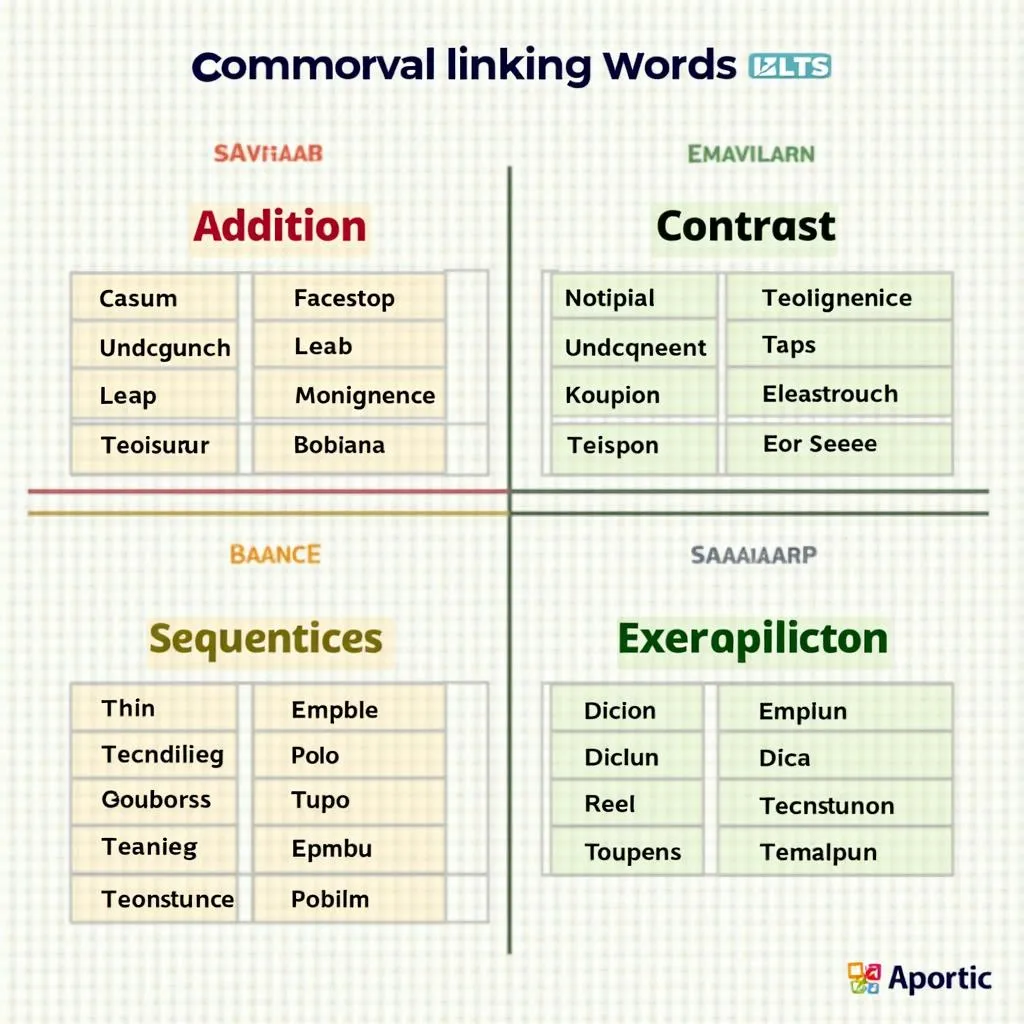Understanding the Importance of Linking Words in IELTS Writing
Linking words, also known as connectors or transitional phrases, play a crucial role in IELTS Writing tasks. These words help create cohesion and coherence in your essays, allowing your ideas to flow smoothly and logically. Proper use of linking words can significantly improve your IELTS Writing score by enhancing the overall structure and readability of your essay.
Types of Linking Words
There are several categories of linking words, each serving a specific purpose in connecting ideas within your essay:
-
Addition: These words are used to add information or ideas.
Examples: furthermore, moreover, in addition, additionally -
Contrast: These words show differences or opposing ideas.
Examples: however, nevertheless, on the other hand, in contrast -
Cause and Effect: These words demonstrate relationships between actions and their results.
Examples: therefore, consequently, as a result, thus -
Sequencing: These words help organize ideas in a logical order.
Examples: firstly, secondly, finally, subsequently -
Exemplification: These words introduce examples to support your arguments.
Examples: for instance, for example, such as, namely

How to Use Linking Words Effectively in IELTS Writing
To maximize the impact of linking words in your IELTS Writing tasks, consider the following tips:
1. Use a Variety of Linking Words
Avoid repetition by incorporating a range of linking words throughout your essay. This demonstrates your vocabulary skills and keeps your writing engaging.
Example:
Poor: “Firstly, pollution is a major problem. Secondly, deforestation is increasing. Thirdly, climate change is affecting ecosystems.”
Better: “To begin with, pollution poses a significant threat to our environment. Furthermore, the alarming rate of deforestation exacerbates the issue. Additionally, the far-reaching effects of climate change are disrupting delicate ecosystems worldwide.”
2. Ensure Appropriate Usage
Use linking words that accurately reflect the relationship between your ideas. Misusing connectors can lead to confusion and affect the coherence of your essay.
Example:
Incorrect: “The government should invest in renewable energy. However, this will reduce carbon emissions.”
Correct: “The government should invest in renewable energy. Consequently, this will reduce carbon emissions.”
3. Don’t Overuse Linking Words
While linking words are important, overusing them can make your writing feel forced or unnatural. Use them judiciously to maintain a balanced and fluent writing style.
Example of overuse:
“Firstly, pollution is a major problem. Moreover, it affects air quality. Furthermore, it impacts human health. In addition, it contributes to climate change. Therefore, we must take action. Thus, governments should implement stricter regulations.”
4. Practice with Different Essay Types
Different IELTS Writing tasks may require different types of linking words. Practice using them in various contexts, such as opinion essays, problem-solution essays, and advantages-disadvantages essays.
Common Mistakes to Avoid When Using Linking Words
1. Starting Every Sentence with a Linking Word
While linking words are useful, not every sentence needs to begin with one. Vary your sentence structures to maintain a natural flow.
Incorrect:
“Firstly, pollution is a major issue. Secondly, deforestation is increasing. Thirdly, climate change is affecting ecosystems. Therefore, we must take action. Consequently, governments should implement policies.”
Correct:
“Pollution is undoubtedly a major issue facing our planet. Additionally, the increasing rate of deforestation compounds the problem. Climate change, a direct result of these factors, is severely impacting ecosystems worldwide. Given these challenges, it is imperative that we take immediate action. Governments, therefore, must implement comprehensive environmental policies to address these concerns.”
2. Using Informal Linking Words
IELTS Writing requires a formal tone. Avoid using colloquial or informal linking words.
Informal: “Anyways, pollution is bad. Plus, it’s getting worse.”
Formal: “In any case, pollution poses significant environmental risks. Moreover, the situation is deteriorating rapidly.”
3. Misunderstanding the Meaning of Linking Words
Ensure you fully understand the meaning and appropriate usage of each linking word to avoid misrepresentation of your ideas.
Incorrect: “The city has excellent public transportation. On the other hand, it has many parks and green spaces.”
Correct: “The city has excellent public transportation. Furthermore, it boasts numerous parks and green spaces.”
Next Steps: Practicing Linking Words in IELTS Writing
To improve your use of linking words in IELTS Writing:
- Create a personal list of linking words categorized by their function.
- Practice incorporating these words into sample IELTS Writing tasks.
- Ask a teacher or language exchange partner to review your use of linking words.
- Read high-scoring IELTS sample essays to observe how linking words are used effectively.
- Take timed practice tests to ensure you can use linking words efficiently under exam conditions.
By mastering the use of common linking words, you’ll significantly enhance the coherence and flow of your IELTS Writing tasks, potentially boosting your overall band score. Remember, effective use of these words demonstrates your language proficiency and ability to construct well-organized, logical arguments – key skills that IELTS examiners are looking for.